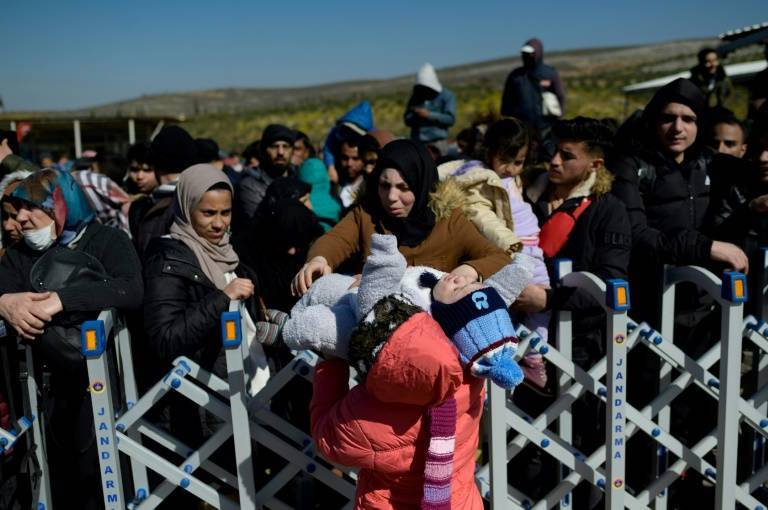
Thousands of Syrian refugees in Turkey returned home after the devastating earthquake. (Credit: AFP)
Social media and the walls of the devastated cities are awash with hate messages against Syrian refugees.
In the days following the devastating Feb. 6 earthquake, which by the latest estimates killed more than 45,000 people across Turkey and Syria, slogans such as “We don't want Syrians,” “Immigrants must be sent back” or “You are no longer welcome” continue to trend on Turkish Twitter.
Targets of far-right xenophobic discourse for several years, scapegoats to whom all the country's ills are attributed, Syrian refugees are once again victims of several attacks in the areas affected by the earthquake.
Some people have accused them of “looting” in the aftermath of the disaster.
“While our nation is in trouble, refugees and fugitives are looting the tents, clothes and food sent to the earthquake victims. It's not enough, they are looting jewelers and even corpses,” far-right Turkish politician Ümit Özdağ posted on his Twitter account on Feb. 10, four days after the tragedy.
This is not surprising from the president of the right-wing Zafer Partisi (“Victory Party”), who has made anti-refugee hatred his trademark. At the end of January, he vowed to finance one-way bus rides for Syrians back to their home country.
In recent days, however, such rhetoric has taken a dramatic turn. While looting was reported after the earthquake — as Justice Minister Bekir Bozdağ said over the weekend that 75 cases of looting were recorded in the earthquake zone and 57 suspects were detained — Syrian refugees, thousands of whom were victims of the same disaster, were immediately blamed.
The finger-pointing triggered a widespread reaction on social media.
‘They treated us like looters’
“Images of people accused of looting, tortured and beaten to death, have been shared,” Cihan Aydin, a lawyer in southern Turkey’s Diyarbakir and member of the pro-Kurdish Peoples' Democratic Party, told L’Orient-Le Jour.
“The desperation caused by the earthquake, combined with racism and hate speech, have heightened the threat against refugees.”
At least three Syrians, residents of the earthquake-affected areas, were violently attacked in the aftermath, according to the Middle East Eye. They were accused of stealing from dilapidated stores as well as from the families of victims still under the rubble — targeted accusations that are provoking general distrust against Syrians.
"Many people accused of looting and of being Syrians, and who in reality are neither,” Aydin said.
This is the story of two brothers living in Antakya, who were walking through the city in search of medicines when they were beaten and accused of stealing from the humanitarian aid shipments. Covered in bruises, one of the two, Mehmet Ozal, filmed himself in a video later published by the Turkish daily Hurriyet.
"We went to the city center with my cousin to buy medicine that our family needed. On the way back, the security forces, who saw the medicine and the backpack in our hands, treated us like looters even though we had shown our identity cards and beat us without mercy,” he said.
“We are innocent victims of the earthquake,” Ozal added.
The Turkish police forces also attacked a young man, Ahmet Guresci, according to the Association of Lawyers for Freedom, an advocacy group. He was arrested on Feb. 12 on suspicion of theft and was severely beaten which resulted in his death at the police station.
The three police officers involved were suspended after a complaint by the Association of Lawyers for Freedom. The origin of the victim was not specified.
Second-class citizens
The politics behind these accusations are thinly veiled. This is apparent in the haste with which Ümit Özdağ published a video, which was later deleted, purporting a Syrian person stealing a watch from a Turkish rescue worker.
The report was denied by the person concerned, who turned out to be a Turkish citizen working in rescue operations, as reported by the daily Evrensel.
The incident, however, speaks volumes about the xenophobic rhetoric that drives the leader of the far-right party, a candidate in Turkey’s presidential elections scheduled for May 14.
Özdağ regularly brandishes the “civilizational threat” posed by refugees in Turkey, whom he says are threatening to make Turks second-class citizens — a discourse that has resonated with a segment of the Turkish population.
Several incidents of discrimination during rescue operations have been reported in recent days.
Some shelters intended for people made homeless after the earthquake have refused to take in Syrians, according to several accounts relayed by the local press.
Riding the wave of panic fueled by false allegations, Özdağ tweeted a rumor that several Syrians broke into a women's shelter in the city of Mersin and smoked hookah while sharing obscene images.
The report was denied by MP Ali Mahir Basarir of the Republican People's Party, Turkey’s main opposition party, who went to the site.
Turkish President Recep Tayyip Erdogan, who since the beginning of the Syrian civil war in 2011 has allowed more than 3.4 million refugees who fled the bloody fighting to find refuge in Turkey, is no exception to the xenophobic rhetoric.
Following the earthquake, thousands of Syrians crossed the border to return temporarily to their home country, taking advantage of an announcement by Turkish authorities that the country would allow them to leave for three to six months and then return.
Faced with rising popular discontent, the Turkish president wants to prove he is “taking action” to send more people back to Syria.
With general elections just months away, and inflation soaring, Erdogan is promising to repatriate Syrians soon and is taking significant steps toward normalization with his old enemy, Syrian President Bashar al-Assad.
This article was originally published in French in L'Orient-Le Jour. Translation by Sahar Ghoussoub.

